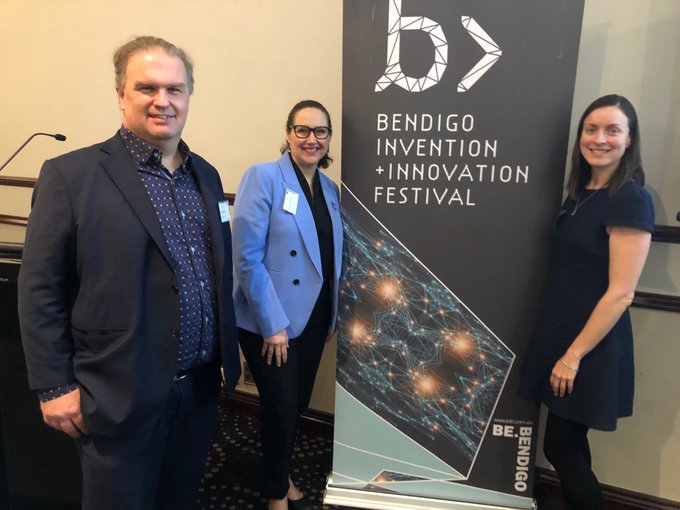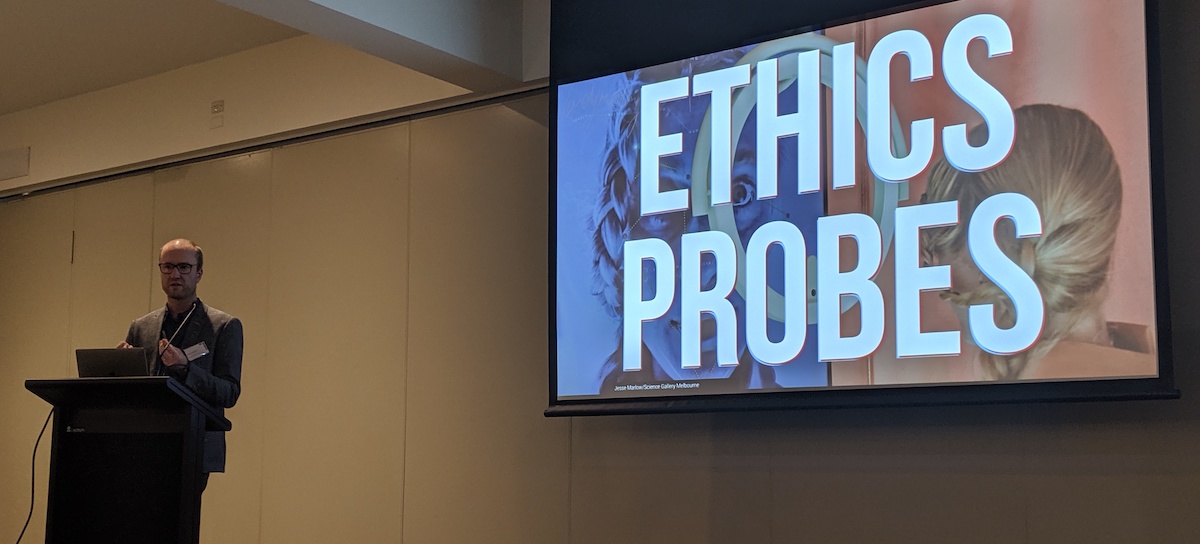Talking innovation: Bendigo Invention + Innovation Festival
By Sarah Barker, Our Community
October 2, 2019
Last month I headed to Bendigo in central Victoria to take part in the Bendigo Invention + Innovation Festival. The festival brings together entrepreneurs and business leaders to talk about what innovation means to them, their businesses and regional communities.
I spoke on two panels: 'Start small, think big: how to capture and utilise data', and 'Bias and ethics in a world of big data and artificial intelligence'. Following are my reflections on those panel sessions.
Start small, think big: how to capture and utilise data
The first session was moderated by Rebecca Ciancio of Maxsum Consulting. Fellow panel member Dr Peter Prevos from Coliban Water gave an overview of three drivers of the data revolution: technological advancements, increased computing power, and the availability of open source tools in the field of applied mathematics and statistics. Along with these drivers, by 2020, around 50% of the Australian workforce will be made up of Millennials and Gen Z, who tend to use and embrace technology in their work, learning and social lives.
I shared the work we're doing at Our Community to develop a simple framework to help not-for-profits understand and plan how to collect, manage and use data. We aim to take some of the magic and mystery out of working with data.
Small businesses can take a similar approach when working with data on:
- Sales
- People
- Operations, including finance
- Customer needs
- Products and services
- Customer satisfaction (and impact, if the business operates for purpose).
They might be concerned with:
- Improving the quality of data being collected
- Improving practices for storing and managing the data
- Exploring and querying the data to generate insights
- Analysing the data and developing reports
- Adopting more sophisticated data-driven techniques such as prediction, optimisation, personalisation and automation.

Dr. Peter Prevos, Manager Data Science, Coliban Water, Rebecca Ciancio, Head of Marketing, Communications and Engagement, Maxsum Solutions and Sarah Barker, Innovation Lab
Small businesses and not-for-profits that are new to collecting and using data are likely to start with 'small data'. This refers to data that is easy for people to browse and analyse using tools that are readily available. However, some 'big data' may be available to you as well, particularly in the area of customer needs. For example, you might be able to draw on geographical information from the National Map or population data from the Australian Bureau of Statistics. This data is much more difficult to work with because of its size and complexity.
Peter and I agreed that building data capabilities in an organisation does not need to start with the implementation of complex infrastructures; rather, it requires data to be embedded into key roles, with executive support. It can be an iterative process starting with simple projects, such as reviewing what data is being captured, and why, and streamlining processes and tools. It takes time for an organisation to build a data culture and to improve its data capabilities.
If an organisation doesn't have the skills needed to get started, training is available. For example, Peter has developed a training program called 'R for Water Professionals' to build the capacity of people in the water industry to mine, analyse and visualise data using cutting-edge tools. ('R' refers to a computer programming language and software used in statistical computing.)
An organisation might also hire professionals or tertiary-level data science students for specific projects. Imagine, for example, a small business that wanted to gain insights into its sales figures. It might hire external help to find out:
- What can you tell us about our sales?
- What are the factors that lead to an increase or decrease in sales? For example, time of day, month, year?
- Who are we selling to? Can they be organised/clustered/segmented in a meaningful way?
This might lead the organisation down a number of paths:
- It may be that the quality of the data is lacking, and there's work to do to collect it more consistently (setting standards, training staff, putting better systems in place)
- Some experiments could be designed to see what results in a bump up or bump down in sales
- The organisation might develop a better understanding of its customer base, then start collecting or sourcing more data to understand customer needs
- There might be value investing in reporting, in order to have up-to-date information at hand when making decisions.
Work like this enables an organisation to get runs on the board quickly, which can be helpful when it comes to building enthusiasm for further efforts to improve processes and tools, and build a data-driven culture.

Dr Niels Wouters moderated the second panel on ethics at BIIF.
Bias and ethics in a world of big data and artifical intelligence
This panel was moderated by Dr Niels Wouters from the University of Melbourne. Niels provided an overview of the research project Biometric Mirror, in which a deliberately flawed facial analysis tool was unleashed on the public to build awareness of and raise questions about the use of artificial intelligence in society.
Dr Peter Prevos outlined the ethical implications of water usage monitoring and the role of Coliban Water in influencing water usage in times of drought.
In our own work at Our Community we've seen evidence of human bias captured in data. For example, our grants management system, SmartyGrants, which is used by hundreds of grantmakers across Australia, suggests that the decisions of assessors are influenced by 'hangriness'. It shows that grant applications assessed just before and during lunchtime tend to score lower than those assessed at other times.
We've also contemplated the ethics of using technology to drive behaviour, such as attempting to influence donor behaviour by presenting different suggested donation amounts on GiveNow, a fee-free donations platform used by community groups and other not-for-profits.
Data-driven tools are being used in decision-making globally, sometimes with disastrous effects. For example, in the USA, the COMPAS recidivism algorithm was found to have resulted in falsely high predictions of recidivism by black criminals, and falsely low predictions of recidivism by white criminals. In Australia, the so-called Robodebt scheme has been widely criticised for the algorithm it uses to calculate 'debts' incurred by welfare recipients. And Amazon abandoned its AI recruiting tool when it was shown to be biased against women (Caroline Criado Perez explores many other examples in her book Invisible Women: Data Bias in a World Designed for Men, and in an accompanying podcast).
Niels, Peter and I discussed some do's and don'ts, when it comes to building ethical data-driven tools:
- Name the person who is accountable
- Involve subject matter experts
- Where possible, involve people represented in the data
- Engage statisticians and scientists who ask good questions
- Be transparent: publish the process as well as the result, and highlight known limitations and biases
- Actively seek feedback
- Be open to discussion: new ideas come from many sources
- Read, read, read: there are many lessons to be learned from others working in this field.
The festival provided a valuable forum for exploring ideas, building connections, and sharing the work we're doing at Our Community.
Questions, comments, feedback?
We're always happy to hear from you! Email us at service@ourcommunity.com.au
You can read more about the Innovation Lab at www.ourcommunity.com.au/innovationlab
